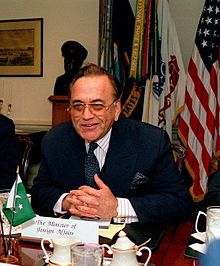Khurshid Mahmud Kasuri
| Khurshid Mahmud Kasuri | |
|---|---|
 |
|
| 23rd Minister of Foreign Affairs (Pakistan) | |
|
In office 23 November 2002 – 15 November 2007 |
|
| President | Pervez Musharraf |
| Prime Minister | Shaukat Aziz |
| Preceded by | Abdul Sattar |
| Succeeded by | Inam-ul-Haq |
| Personal details | |
| Born |
Mian Khurshid Mahmood Kasuri 18 June 1941 Lahore, Punjab, British India (Now In Pakistan) |
| Nationality | Indian (1941-1947) Pakistani -1947 Present |
| Political party | Pakistan Tehreek-e-Insaf |
| Other political affiliations |
Pakistan Muslim League Q |
| Alma mater |
Punjab University Government College University Cambridge University Oxford University Sorbonne University University of Nice |
Khurshid Mahmud Kasuri (Urdu: خورشيد محمود قصورى; b. 18 June 1941), is a Pakistani politician and writer who served as the Minister of Foreign Affairs of Pakistan between November 2002 until November 2007. He is the Senior Advisor on Political and International Affairs and Chairman of the Pakistan Tehreek-e-Insaf's Task Force on Kashmir and a member of the Core Committee of the Party. He is also the author of ‘Neither a Hawk Nor a Dove.
Educated at the Punjab University, Kasuri later studied law at Cambridge and was subsequently admitted as a barrister at the Gray's Inn. He also went on to study french at Nice. He started his political career with the Tehreek-e-Istaqlal (TI) led by Air-Marshal Muhammad Asghar Khan. The TI was then the main opposition party. He rose to be its Secretary General. He was also elected as the Secretary General of the main opposition alliance, the Pakistan Democratic Alliance in 1993. He went to prison on several occasions when Bhutto and General Zia ul Haq were in power for his opposition to both. He was elected to the National Assembly in 1997 and 2002. He was elected as Chairman of the Standing Committee on Information and Media Development. He staunchly opposed the 15th Amendment to the Constitution (‘Shariat Bill’) during the Prime Minister ship of Nawaz Sharif. He resigned from membership of the National Assembly as a mark of protest against the 15th Amendment, saying that if passed in its original form, it would negate Quaid-i-Azam Muhammad Ali Jinnah’s pluralistic and progressive vision of Pakistan. He left the foreign office to join the Movement for the Restoration of Democracy in 1981 and was subsequently arrested.
...
Wikipedia
